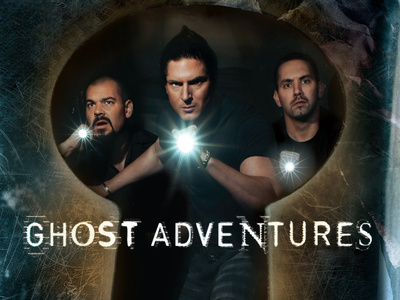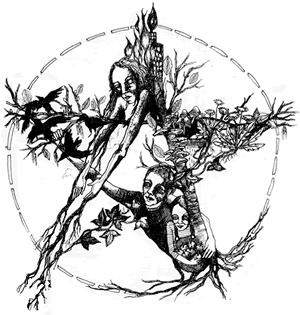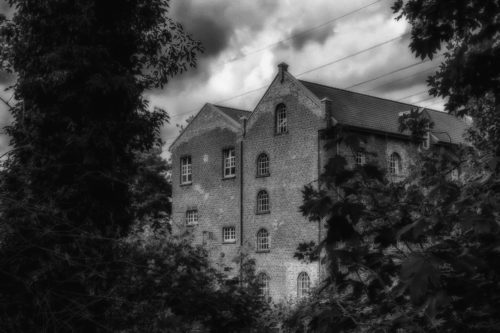WOLF CREEK, Ore. — The paranormal reality show Ghost Adventures (2008- ) blamed a local Witch community for the hauntings being reported in a Oregon ghost town. Airing Sept. 23, the episode “Golden Ghost Town” finds the Ghost Adventures crew in an old mining town in southwestern Oregon. The old town, which is currently in a state park and being restored, is well-known for its hauntings, which the show labels as being demonic and “unleashed” by local Witches.

As is explained in the show and by various websites, Golden, Oregon was once a mining town established by Chinese immigrants. The promise of gold attracted William Ruble, who eventually purchased much of the land and established the town with the post office opening in 1896. Ruble was reportedly very religious and kept Golden dry.
However, the town only lasted until1920, when the post office officially closed. The area was abandoned, leaving only dilapidated structures and, apparently, some ghosts.
When the September episode of Ghost Adventures opens, the crew, made up of Zak Bagans, Aaron Goodwin, Billy Tolley and Jay Wasley, is driving into the abandoned town. One of them feels an immediate sensation, saying his stomach hurts. Later, several of the interviewees say the same thing.
Bagans then interviews local religious official Archbishop Cloud, who claims that he heard rumors of “occult activity” taking place in the church after it was abandoned. This activity, as he explains, has “desecrated” the sacred space. This type of religion-based narrative is not unique to this show or to paranormal reality stories. In fact, such a narrative structure provides the baseline for a large percentage of ghost-related fictional works. In these stories, a sacred space of some sort, as typically-defined by Catholic theology, is violated, misused, or abandoned, consequently attracting evil. In other cases, it is only the sacred that can save.
However, in this particular show, the ghost adventure goes so far as to blame modern Witches for the haunting, rather than only dead ones from some long ago past.
After experiencing an encounter at night in the abandoned Golden church, the archbishop and Bagans discuss “what might be feeding the malevolence that permeates the entire area.” Bagans asks Cloud, “Have you ever heard about this sanctuary out here in the woods somewhere that is very close to this? They do these rituals; I know it’s Witchcraft. It said Pagan rituals. Have you heard about this group?”
Cloud answers he has and that the Witches are all over, and that the ritual practices are “steeped in Witchcraft,” and that he is sure that “they are conjuring demons.” Another interviewee later confirms that by saying that she “knows” it is caused by the local Witches.
During the discussion between Cloud and Bagans, there are flashes of various images of people at night in the woods obscured by branches and trees. The entire sequence, which includes hanging stick figures and dramatic sound, is reminiscent of The Blair Witch Project (1999).
“Could the unusual number of violent acts in this area be caused by the dark entities conjured by this group of Witches?” asks the narrator.
Interestingly enough, there actually is a Witch camp not far from Golden. Bagans is right; the area does have modern Witches performing modern Pagan rituals.
It is Free Cascadia Witchcamp, one of Reclaiming’s annual retreats. Last year, the week-long event happened in late June, quite possibly at the same time the show was being filmed. However, that has not yet been confirmed.

Witchcamp Council logo.
During the show, Bagans claims that he attempted to interview and meet the 100-plus people at this Witch camp, adding that his request was denied. They are a “very secretive group,” he explain, “Which raises the question what are they doing? What are they conjuring?” It also has not yet been confirmed whether he actually did reach out to anyone from Reclaiming, or any modern Pagans in the region.
Like many paranormal stories, the entire Ghost Adventures episode feeds off of the theme that the Witch activity is feeding whatever was once conjured back when the church first shut down. The absence of the protection of the church, so to speak, leaves a void for evil, as the story goes.
The show concludes that the hauntings are mainly due to these “man-made” conjurings, both old and new, and they have affected the region’s animals and have enchanted the forest.
While elements of Witchcraft are commonly recalled in paranormal reality stories, this one points very directly to modern Witchcraft practice in an accusatory manner, and has Pagans, who regularly enjoy such shows, deeply concerned.
Peter Wize told TWH, “I have been an avid watcher of Travel Channel’s Ghost Adventures for some time. In one of their recent seasons I have noticed an increasing level of anti-Wiccan /Pagan bias on the show.” Wize found the episode “offensive and openly hateful toward Wiccan, Pagan and Heathen people.”
“I have also noticed that in recent months the Travel Channel’s other ghost hunting show Dead Files has also had a radical traditional Catholic influence to it as well,” Wize adds. “The RTC Christian sect has had a history of paranormal investigation going back to Elizabeth and Ed Warren of ghost hunting fame who called themselves ‘religious demonologists’. Needless to say they take a dime view of witches and occultism in general.”
As Wize notes, the Warrens were famous or infamous for their religion-based paranormal research. Their stories have inspired many fiction films, such as The Conjuring (2013), Annabelle (2017), and perhaps the most famous, Amityville Horror (1979). The concept of the paranormal in such stories pits Christianity, as the safe and sacred, against the occult, as the evil and the ruin of humanity. This is an age-old duality of good versus evil, noted by other Pagans who showed concern.
Like Wize, Yaya Nsasi Vence Guerra is a fan of paranormal reality shows. She explains that, as a medium, she enjoys watching them and critiquing them. “They are entertaining,” she says.
However, Nsasi also recognizes the problem. In an email interview with TWH, she wrote, “Rather than educate, many of these paranormal shows prey on this nation’s puritanical and traditional views of religion. They demonize that which is considered ‘other.’ They give any practice that is non-Abrahamic as ‘occultism.'”
Along with being a medium, Nsasi is a Yaya Nganga in Palo Mayombe, and a devotee of Santa Muerte. She says, “Many religious denominations view the occult as being anything supernatural or paranormal which is not achieved by or through the god of the Bible, and is therefore considered the work of an opposing and malevolent entity. This is how we then see all paranormal activity connected to demons. Altars are portrayed as gateways to Hell or other dimensions. It gets tiresome.”
“Ghost Adventures is sensationalistic and is constantly naming Satantic practices as the reason house have demon entities,” Nsasi continues.
“This is not to say that there aren’t demons. However, it doesn’t take into account that some entities are not demonic. Some entities are just plain dark, lower-level entities that are operating on low frequencies. There isn’t an exploration of the metaphysical components of the given aspects of all entities; frequencies, how frequencies work, elevated spirits versus lower spirits. It’s always Satan and demons.”
However, according to a 2016 TWH interview with Paranormal Lockdown stars Nick Groff and Katrina Weidman, the reason is not always one of disrespect.

Katrina Weidman and Nick Groff.
In that interview, both Groff, who once himself starred on Ghost Adventures, and Weidman said that they are not personally religious at all, and that they are very aware of the modern Witchcraft community. However, they both noted that the language of paranormal research is steeped in Catholic theology. It is just what is used, for better or worse.
When asked if they ever consulted or worked with Witches or Wiccans on their show, they said that they had, and welcomed the opportunity. One such person that they cited was author, medium, psychic, and television personality Michelle Belanger.
Belanger is best known in the paranormal world for her work on A&E’s Paranormal State, but she is also considered an expert on paranormal research and the occult in general. One of her books dives into the intersection between occult and the paranormal disciplines. That book, Ghost Hunter’s Guide to the Occult,was published in 2013.
The book’s advertising blurb reads, “How do you tell the difference between the symbol for the Order of the Eastern Star and a pentagram? What does a Wiccan mean when she says she practices Witchcraft? Paranormal State’s Michelle Belanger explores the complex and sometimes confusing realm of the occult, outlining the history of the Western tradition, defining key terms, and exploring the meaning of a variety of icons and symbols.”
The need for such an explanatory text appears to be important considering Groff and Weidman’s statements concerning the language used in paranormal research, which has lead to or has supported the negative, or at the very least confused, portrayals of occult practices, including Witchcraft.
Outside of the religious aspects of the paranormal shows, Nsasi also notes her concern over the treatment of the dead. She says, “Sometimes it gets frustrating because they don’t respect the spiritual realm.”
“Many of the ghost hunters have this hubris about them,” she goes on to say. “They are the living; they have audio recording devices, ghost meter sensors, electromagnetic field radiation equipment, digital spirit voice detectors and, what not. Here, they are all powerful mortals. When the truth is, that these spirits are more powerful than we are and our alliance with them can create beautiful and wonderful things.”
Despite these concerns, many Pagans join the general viewership in being fascinated with ghost hunting and the paranormal. Many of those that we spoke to said that they enjoyed seeing the reality of spirits recognized in the mainstream media.
Alpandia, a Strega living in South Florida who likes going to haunted places herself, says that she enjoys the stories. “It’s another connection to a time past and people who lived before. And seeing the look on the face of the investigators when they are in the moment and have what they feel is a genuine interaction is always fun.”
Emrys, a Witch in Pennsylvania, agreed. She said, “I enjoy the historical and biographical aspects of these shows. They tend to share stories of everyday people you wouldn’t learn about in regular history classes.”
In a 2017 TWH interview, paranormal researcher Brian Laythe did say, however, that “not a single T.V. show […] practices anything close to a reliable scientific method for verifying paranormal claims. Producers want ratings and excitement, not valid science. Thus, most (if not all) shows promote shoddy practice and their own paranormal perspective. Not anything that would come close to science.”
While that may be the case, paranormal reality shows, such as Ghost Adventures, are undoubtedly popular and have been since the early days of television. There is a basic human fascination with this type of storytelling experience whether it is accurate science or not, from the fictional horror films or television serials, to the reality-based shows, or to the lived experience of legend-tripping fun.

[Courtesy ISRAE website.]
Laythe, who wants to see more occult and magical studies used within actual paranormal research, said, “A scientist is a scientist. We respect all religions, practices, and faiths. Most people don’t separate phenomena (what physically occurred) from the interpretation (whether Christian, Pagan, or otherwise). Any legitimate parapsychologist should be able to separate the two. In other words, something floating is something floating. Whether it was [the Abrahamic] god, the devil, an angel, or Odin is a function of peoples[sic] interpretation of the event.”
In that light, the general fascination with what is termed “the paranormal” is not really much different than the enduring fascination with the occult. The two have more in common than they do different.
The Wild Hunt is not responsible for links to external content.
To join a conversation on this post:
Visit our The Wild Hunt subreddit! Point your favorite browser to https://www.reddit.com/r/The_Wild_Hunt_News/, then click “JOIN”. Make sure to click the bell, too, to be notified of new articles posted to our subreddit.